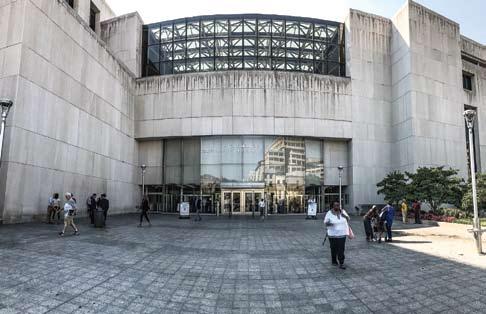
8 minute read
The Unseen Pandemic:With
The Unseen Pandemic Domestic violence risk has increased during the coronavirus, creating its own pandemic behind closed doors. But as the number of cases increases, court backlogs have made it difficult for some survivors to seek justice.
By Lora Strum
Advertisement
Contributing Writer Since the coronavirus pandemic began, Kirisha Marshall has spent more time handling her clients’ confusion and concern than litigating their domestic violence cases.
Ordinarily, Marshall, a staff attorney with Break the Cycle, an organization providing legal services to survivors of dating abuse between the ages of 12 and 24, would spend her days at the D.C. Superior Court’s Domestic Violence Division, securing protective orders or representing her clients at hearings. But since March 16, when the coronavirus forced D.C. courts to suspend all in-person arguments and shift services online, Marshall has struggled to move her cases forward.
“The courts were not prepared for anything when it came to COVID,” Marshall says. “We have cases from the beginning of March— before the pandemic—that are just not happening. My clients are confused, defeated. They feel like nothing is happening.”
In response to the COVID-19 crisis, the DVD has continued (or, in lay terms, postponed) all status and evidentiary hearings, including those for nonpriority custody, divorce, or child support matters, until at least October. Arraignments for domestic violence misdemeanors are being held in one of four remote courtrooms available to the division. Citation hearings and contempt of court charges, including violations of protective orders, will not be heard until the fall.
Advocates who traditionally work in the Domestic Violence Intake Center at Moultrie Courthouse have done their jobs remotely since the courts closed. The Center was often the first place, other than a police station, where a victim would file for a protective order. Survivors must now file online for a temporary protection order. TPOs offer survivors two weeks of protection from their abuser before they must file for a civil protection order, which lasts up to one year.
During the pandemic, the DVD has ruled that TPOs will not expire. Initially, the DVD ruled that CPOs, too, would be stayed during the public health emergency. It reversed that decision in June, requiring survivors with an existing order to file a motion to extend it using its online system. Currently, hearings for new or contested CPOs, where the petitioner and the respondent must be present, have been continued for at least three months, barring emergencies.
“We’re seeing more violations of TPOs while waiting to see a CPO resolve, which may not be until October,” Rebecca Simpson, legal director of the D.C. Volunteer Lawyers Project, says. “For some clients, this is a safety issue.”
Simpson also notes that judges have become more discerning when granting TPOs under these new regulations. She suspects they may be hesitant to issue an order that is essentially permanent without hearing oral arguments.
“When you’re talking about a TPO lasting three or four months, rather than two weeks, it’s hard to imagine, as a judge, to not factor that in,” Simpson says.
A representative for the DVD was unable to be reached for comment on how the public emergency may affect whether protective orders are issued and how dockets are determined.
When a protective order is not issued or is delayed, not only does a petitioner remain vulnerable to abuse, but their case also joins a backlog created when the pandemic first began and the courts temporarily stopped accepting cases while services moved online.
Statements from the D.C. Superior Court emphasize its dedication to maintaining, if not increasing, access through online systems, but Simpson describes the early days of this transition as “complete chaos.”
“We were just emailing things for protective orders and motions,” she says.
Prior to the pandemic, CPOs could not be filed online, though infrastructure to file a TPO electronically did exist in the seldom used probono.net. This service was expanded over the past five months, but it’s not a permanent solution. Stopgap measures include prioritizing emergencies and continuing most cases until the system can return to “normal.”
But normal has yet to come, and constant delays have created a bottleneck.
Previously, the attorneys Simpson supervises would carry up to eight CPO cases at a time. Delays and shutdowns have increased that caseload to roughly 22 CPO cases per attorney. Simpson is concerned about overwork when courts reopen, but even stalled cases still have her attention. “Even though nothing is happening, that client is still our client,” she says.
Tracy Davis, the managing attorney at Bread for the City, a local organization helping to close the justice gap in low-income communities, worries that the backlog, coupled with unclear messaging and complicated virtual systems, will only discourage survivors. Her organization has already noticed a decrease in the number of petitions for protection orders. This April, 263 CPOs petitions were filed with the DVD compared to 457 in April 2019.
“I just don’t know what to do,” Davis says. “The courts are trying … but it’s pretty horrific.”
In a statement, the DVD announced that it intends to be back to full capacity in late July or early August. That includes resuming attorney mediation in some CPO cases as well as increasing the number of cases heard remotely. Currently, two-thirds of the courtrooms are available for remote trials, but Marshall, who works with low-income individuals who often lack access to laptops or smartphones, worries her clients will be unable to appear remotely.
“Judges expect everyone in 2020 to have a laptop. But this isn’t a jury summons. You can’t order someone to appear,” Marshall says.
If a party fails to appear, their case is dismissed and the process begins again, moving the case even deeper into the backlog. In an effort to move things along, Marshall reports that the Office of the Attorney General is focusing on cases where service—when a respondent has been served with a protective order—can be proven. The courts have ruled that electronic service, such as a text message, is permitted. But if that can’t be done, the difficult work of tracking down respondents has become even harder during the pandemic.
“With COVID, we have to heavily rely on police officers to do service for us,” Marshall says. “Even though you would think people would be at home, they’re not. They’re evading service and investigators are choosing not to investigate.”
The Metropolitan Police Department Office of Communications reports no gaps in its services. If possible, police ask respondents to step outside to make reports and all officers are instructed to wear their masks when maintaining social distance is not possible. These restrictions, though necessary, have increased delays. Simpson has experienced difficulties obtaining incident reports, which are often necessary for a protective order, and uncertainty from law enforcement over whether an order to vacate violates the shelter-in-place mandate.
Given the confusion, a lot of cases may hinge on what happens when remote trials are underway. But remote trials last much longer as protocol is put in place for how to email evidence or subpoena witnesses for a video call. Simpson fears the stress from constant setbacks may affect her clients’ ability to present their case.
“When you have someone who has been traumatized, it’s hard enough for them to testify calmly and coherently and be believed by judges. When you don’t have the opportunity for them to appear in person, it can be a real disadvantage,” Simpson says.
Remote trials also present a unique risk to domestic violence survivors with confidential addresses. Any identifying details that may appear in the background of a video call could compromise their safety. Marshall tries to bring clients into her workspace or other secure locations, but with social distancing restrictions, this is hard.
Like Marshall’s clients, Davis’ clients are low-income and struggling to access safe housing, food, and health care during the pandemic. “My concern is that, by the time their hearing comes up, it will not be the number one priority and they won’t follow through,” Davis says.
Not reaching survivors at this critical moment is what worries Natalia Otero, executive director of DC SAFE, the only 24/7 crisis intervention agency for domestic violence in D.C. Domestic violence has a very human toll, Otero says, and the coronavirus may prevent survivors from finding relief, legal or otherwise.
“You think about a survivor at home with a very dangerous abuser, you think about someone being monitored 24/7 [by their abuser],” she says. “How do you reach them?”

Dear City Paper Readers,
We are excited to announce that we will release the results of our 2020 Best of D.C. poll on Thursday, September 17. Although we continue to monitor the public health crisis, we’ve gotten a steady stream of requests from local businesses looking for a spark of hope and something to celebrate.
Helping to support these local businesses and organizations is a top priority for us because a community newspaper can’t survive without a thriving local business community. Since the start of the pandemic, we’ve provided more than $100,000 in donated and matched advertising to help local business owners promote their reopening plans and nonprofits raise funds for worthy causes.
In addition to releasing our Reader Picks, we’re also planning changes to our Editorial Picks to reflect what’s happening and call out the people and things that kept us fed, entertained, and made us laugh during these trying times.
We hope that you will join us in safely celebrating these favorite neighborhood businesses, places, and people that make our city feel like home. And we hope that you continue reading our to-the-minute updates on what’s happening in our city.

If You’re Interested in Supporting Us
More than 1,000 of our readers have stepped up to become paying members and are helping us sustain our local news operations. We need them—and we need you. With an unclear outlook for the future, we have lost a lot of money from canceled events and lost ad sales.
Please help us remain a resource for EVERYONE in our community by becoming a member. Not only does it feel great to support your local newspaper, but you’ll get some fun City Paper swag, too. To become a member, visit washingtoncitypaper.com/membership.
If You’re a Small Business Owner
We are committed to supporting you to navigate these turbulent times. We have hosted free and educational webinars for local businesses to help you stay on top of important topics like the latest trends in marketing and how to grow your customer base with email marketing.
If you’re interested in learning more about these free resources or about Best of D.C., please contact ads@washingtoncitypaper.com.





